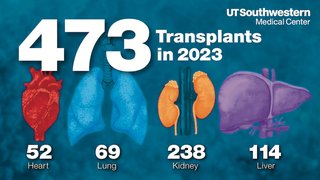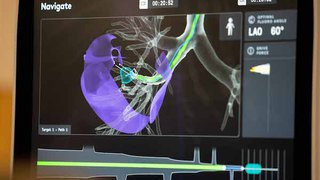What Are Treatments for Pulmonary Fibrosis?
The care team works to develop an individualized treatment plan based on each patient’s overall health, specific symptoms, and other health conditions. Treatment plans can include:
Medications
Medications to treat ILD and its symptoms include:
- Pirfenidone (Esbriet) and nintedanib (OFEV) to slow progression of the disease
- Prednisone and other immunosuppressant medications to reduce the amount of inflammation in the lungs
Nonsurgical Treatments
Our nonsurgical therapies include oxygen therapy, which can ease breathing, reduce the risk of complications from low blood-oxygen levels, and prevent high blood pressure in the lungs (pulmonary hypertension).
At UT Southwestern, we also offer pulmonary rehabilitation, a long-term outpatient program with specialized therapists. Pulmonary rehab can improve lung function and overall health, and we always recommend it after a lung transplant. Our services include:
- Breathing and coughing techniques
- Counseling and support
- Nutritional counseling
- Physical exercise
Lung Transplant
For people with advanced PF and severe lung damage, a single or double lung transplant can improve the ability to breathe and exercise. UT Southwestern Medical Center’s Lung Transplant Program recently achieved the milestone of completing 1,000 lung transplants.










